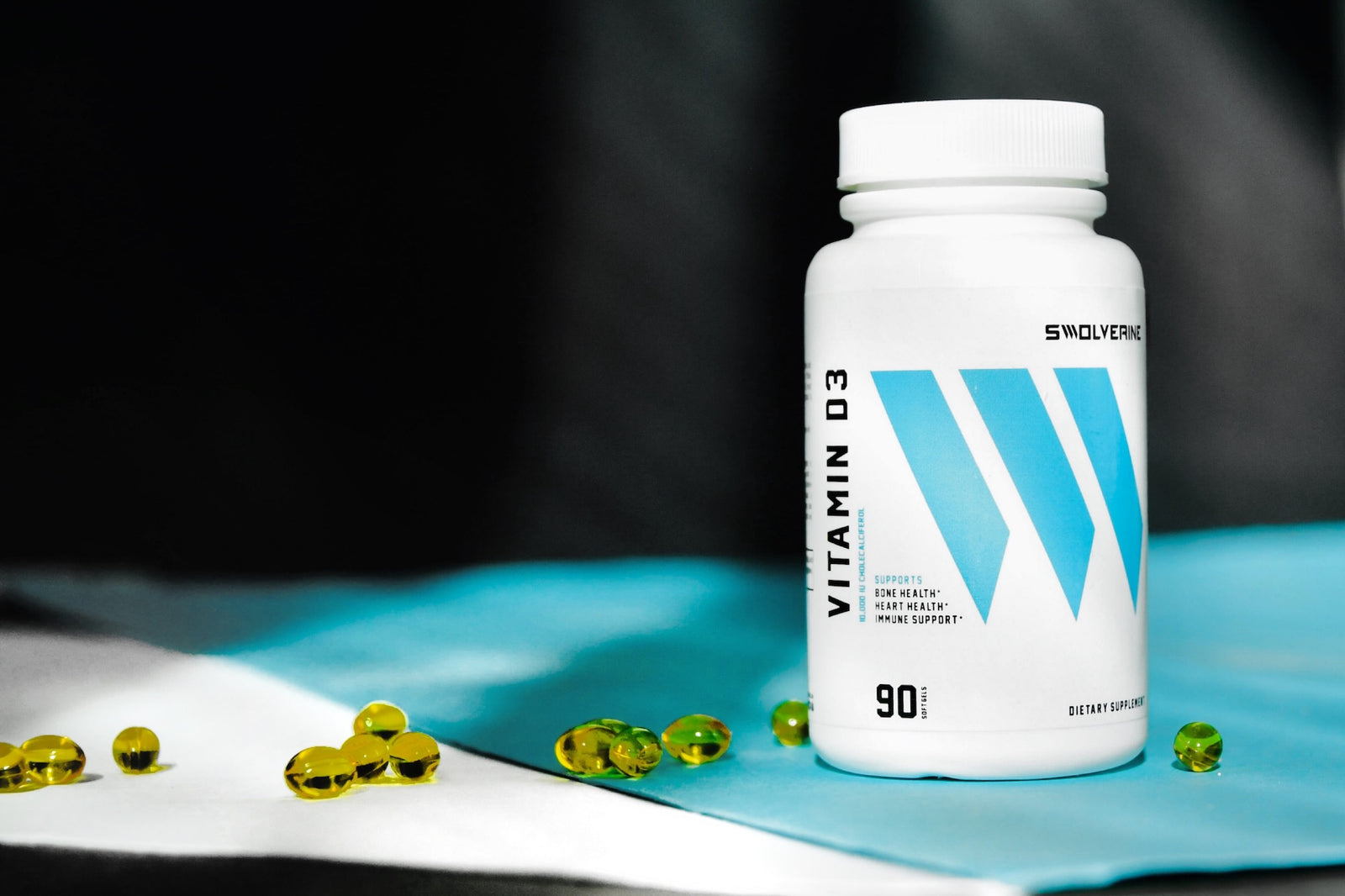Vitamin D plays a much bigger role in your health and wellness than you may think. Studies have shown that Vitamin D may have significant health benefits in the prevention of chronic disease. It’s estimated that nearly 1 billion people or 50% of the world population are vitamin D deficient. Low vitamin D levels can result in abnormalities in bone metabolism, slow wound healing, chronic fatigue, depressed mood states, muscle weakness, and depression. Vitamin D is very difficult to attain through diet alone. Therefore supplementation in addition to dietary sources is crucial in order to get the vitamin D you need for optimal health and wellness. Get a deeper insight into the 7 signs and symptoms of vitamin D deficiency in adults.
How Does Vitamin D Work?
Obtained from the sun and synthesized through the skin, vitamin D is an integral component of overall health and wellness. Vitamin D is unique in the fact, that it doesn’t function like a vitamin, but more like a hormone. Classified as a pro-hormone, Vitamin D is an essential component in bone and mineral metabolism. Often hard to obtain through dietary sources alone, supplementation is crucial for health and wellness. According to a national nutrition examination survey 41.6% of US adults exhibited vitamin D deficiency, with the highest rate seen in African Americans at 82.1% followed by those of Hispanic descent at 69.2% [R]. Since Vitamin D is a fat-soluble vitamin, it’s crucial that you pair vitamin D with a fat, to enable optimal absorption and calcium uptake. Swolverine’s Vitamin D3 is 10,000 IUS suspended in olive oil for optimal absorption and potency.
7 Signs and Symptoms of Vitamin D Deficiency in Adults
1. Chronic Fatigue
Constantly being tired, and fatigued, is a definite sign and symptom of low vitamin d levels. Unfortunately, fatigue often overlooked and underdiagnosed as a potential cause. In a double-blind placebo-controlled trial, published in the journal Medicine 120 participants with fatigue and vitamin d deficiency were enrolled to examine the effects of vitamin d supplementation compared to placebo treatment on fatigue factors. The study found that a clinical dose of 25,000 IU per week, helped improved fatigue in those with vitamin d deficiency.
Therefore, if you’re experiencing chronic fatigue, consult your physician and have a blood panel done. You might be one, of the one billion people, who are vitamin D deficient.
2. Muscle Atrophy
Studies have shown that Vitamin D deficiency may result in muscle atrophy or the loss of muscle mass. Vitamin D metabolites affect the muscle by mediating gene transcription and vitamin D receptors (VDR). Vitamin D supplementation induces rapid changes to these biochemical processes resulting in enhanced calcium uptake, directly affecting muscle strength [R].
3. Muscle Pain
The source which causes muscle pain can be very difficult to diagnose. Some research suggests that low vitamin D levels from less exposure to the sun could be a major cause of persistent muscle pain. This was confirmed by injecting a single dose of vitamin D intravenously into patients, which immediately resulted in relieved bone and muscle pain [R, R].
A Swiss study, conducted at the University of Bern, found that 71% of study participants exhibiting chronic pain and hyperalgesia were Vitamin D deficient.
Another interesting study examined 120 children who were exhibiting recurrent growing pains, lasting more than 6 months. Following vitamin D supplementation, the mean VAS score (commonly known as pain score) was reduced from 6.8 to 2.9, resulting in a mean reduction of 3.8 at the 3-month follow-up. A reduction of 57% [R].

Vitamin D receptors are found in nerve cells called nociceptors which interpret pain. Nociceptive pain is the most common type of physical pain people experience. This is why low vitamin D levels are thought to have an impact on muscle and bone pain.
4. Weak Immune System
One of the key functions of vitamin D is keeping your immune system healthy and strong. Research shows that Vitamin D deficiency is associated with increased susceptibility to infection [R].
In what I call a Mega-Study nearly 19,000 participants showed that individuals with lower vitamin D levels were more likely to report an upper respiratory tract infection than those with sufficient levels even after adjusting for variables including season, age, gender, body mass, and race [R].
RELATED ARTICLE The 5 Best Vitamins To Build A Stronger Immune System
90% of our vitamin D comes from our skin's exposure to the sun. However, during the fall and winter months, the sun's ultraviolet light is not strong enough to synthesize the amounts of vitamin D that we need. For those living in colder climates who are not able to synthesize adequate levels of vitamin D from the sun supplementing with Vitamin D is crucial especially during the winter months to keep your immune system healthy and strong.
RELATED ARTICLE Do I Need Vitamin D3?
5. Depressed Mood State
One of the most perceptible symptoms of vitamin D deficiency in adults is depression. Depression impairs all aspects of human function and according to the World Health Organization, depression is the leading cause of disability worldwide, affecting about 121 million people [R]. A recent report, which evaluated several women studies determined that low vitamin D levels were associated with higher incidences of mood disorders in women specifically premenstrual syndrome, seasonal affective disorder, non-specified mood disorder, and major depressive disorders [R].
In a large-scale study, evaluating the effect of Vitamin D supplementation on depressive mood state, 441 participants were randomized into one of three groups. The groups consisted of supplementing with either (20,000IU cholecalciferol given twice per week (10,000 IU 4 times per week), once per week, or not at all (placebo). All participants also received 500mg of calcium per day. The results found a significant improvement in depression amongst participants supplementing with Vitamin D [R].
6. Back Pain
Low back pain is a chronic condition, which debilitates millions of people and lowers overall quality of life. Several observational and controlled studies have found that vitamin D deficiency may be related to chronic musculoskeletal chronic low back pain [R, R, R]. In a very large observational study with over 9,000 study participants, it was found that low vitamin D levels were directly related to back pain, its severity, and difficulty in performing daily activities.
7. Impaired Wound Healing
Chronic in-healable wounds are often associated and can be a sign of low vitamin D levels. Vitamin D is vital in the crucial for the production of new skin and as part of the wound healing process. A study examining the effects of vitamin D on patients with foot ulcers due to diabetes found that vitamin D may play an indirect role in wound healing due to its effect on improved glycemic control.
Animal studies have shown similar results with vitamin D supplementation on diabetic wound closure [R].
Although there have been promising results, more studies need to be conducted in order to investigate vitamin D's role as a treatment option for wound healing.
How Much Vitamin D Should You Take?
The recommended daily intake of Vitamin D3 is between 400-800IU. However, those with vitamin D deficiencies, or exhibiting signs and symptoms of low vitamin D levels, should take a higher dose to normalize levels. Studies suggest that a dose of 1,000-4,000 IUS daily is the optimal dose. The bottom line is that everyone is different, and requires different levels for optimal health and wellness. Studies suggest that up to 10,000 IUs can be taken is safe and efficacious.
Signs and Symptoms of Vitamin D Deficiency in Adults: Takeaway
Considering that vitamin D is hard to obtain from diet alone it's no surprise that 50% of the entire world population is vitamin D deficient. If you’re exhibiting any of these signs or symptoms, consult your physician and have a blood panel done. Chances are you have low vitamin D levels. By adding a high-quality vitamin D3 supplement to your daily routine, you can improve your immune health, relieve chronic fatigue, and improve your overall quality of life.
Are you Vitamin D deficient?
Swolverine's VITAMIN D3 is a mega-dose of 10,000 IUs encapsulated in olive oil to maximize potency and absorption. Vitamin D3 is proven to support immune system function, enhance mood state, and optimize bone and muscle tissue health. Vitamin D3 is the clinical dose of sunshine you need to help you get through those long gloomy days.
SWOLVERINE is an endurance athlete and active lifestyle brand. Made for the elite athlete, and the strong-willed our products were designed to fuel your athletic performance. We perform when you perform.
We believe that everyone can optimize not only their athletic performance but their human potential. The way we believe we can optimize performance is through transparency, clinically effective doses, and clinically proven ingredients with evidence-based outcomes. We provide the nutrients you need to power your active lifestyle.
References
Sahota, Opinder. “Understanding vitamin D deficiency.” Age and ageing vol. 43,5 (2014): 589-91. doi:10.1093/ageing/afu104
Murphy PK, Wagner CL. Vitamin D and mood disorders among women: An integrative review. Journal of Midwifery & Women’s Health. 2008;53(5):440–446. [PubMed] [Google Scholar]
Jorde R, Sneve M, Figenschau Y, Svartberg J, Waterloo K. Effects of vitamin D supplementation on symptoms of depression in overweight and obese subjects: Randomized double blind trial. Journal of Internal Medicine. 2008;264:599–609. [PubMed] [Google Scholar]
Masood H, Narang AP, Bhat IA, Shah GN. Persistent limb pain and raised serum alkaline phosphatase the earliest markers of subclinical hypovitaminosis D in Kashmir. Indian J Physiol Pharmacol. 1989;33(4):259-61.
Knutsen KV, Brekke M, Gjelstad S, Lagerløv P. Vitamin D status in patients with musculoskeletal pain, fatigue and headache: a cross-sectional descriptive study in a multi-ethnic general practice in Norway. Scand J Prim Health Care. 2010;28(3):166-71
Von känel R, Müller-hartmannsgruber V, Kokinogenis G, Egloff N. Vitamin D and central hypersensitivity in patients with chronic pain. Pain Med. 2014;15(9):1609-18.qkiqioik.
Vehapoglu A, Turel O, Turkmen S, et al. Are Growing Pains Related to Vitamin D Deficiency? Efficacy of Vitamin D Therapy for Resolution of Symptoms. Med Princ Pract. 2015;24(4):332-8.
Erkal MZ, Wilde J, Bilgin Y, et al. High prevalence of vitamin D deficiency, secondary hyperparathyroidism and generalized bone pain in Turkish immigrants in Germany: identification of risk factors. Osteoporos Int. 2006;17(8):1133-40.
Ghai B, Bansal D, Kapil G, Kanukula R, Lavudiya S, Sachdeva N. High Prevalence of Hypovitaminosis D in Indian Chronic Low Back Patients. Pain Physician. 2015;18(5):E853-62.
E silva AV, Lacativa PG, Russo LA, De gregório LH, Pinheiro RA, Marinheiro LP. Association of back pain with hypovitaminosis D in postmenopausal women with low bone mass. BMC Musculoskelet Disord. 2013;14:184.
Forrest KY, Stuhldreher WL. Prevalence and correlates of vitamin D deficiency in US adults. Nutr Res. 2011;31(1):48-54.
Yuan, YiFeng et al. “Vitamin D ameliorates impaired wound healing in streptozotocin-induced diabetic mice by suppressing NF-κB-mediated inflammatory genes.” Bioscience reports vol. 38,2 BSR20171294. 5 Mar. 2018, doi:10.1042/BSR20171294
















